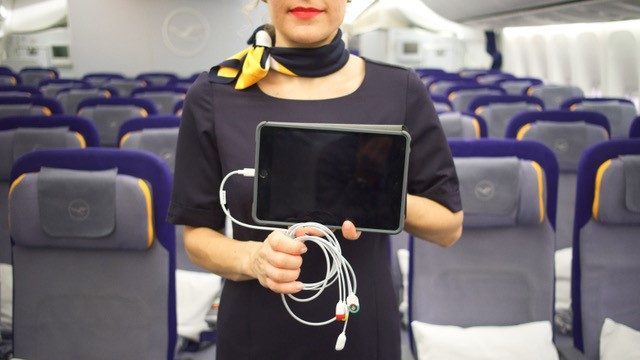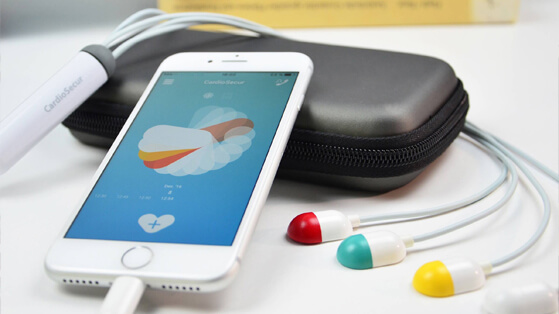ECG analysis in an emergency

Someone with medical knowledge on board?
How our product manager was able to help avoid a forced landing of his flight with the CardioSecur mobile ECG system.
After four intense days at the trade fair, long waiting times at the airport and a departure under Corona conditions, Robin Etzel and his Corscience colleagues boarded the plane bound for Germany with the hope of a relaxed night flight. They are on their way back from Arab Health in Dubai, a leading trade fair for the international medical industry.
Medical help required
“It felt like three in the morning when we heard the announcement,” tells Robin Etzel, Group Product Manager at Corscience. A medical incident on board, the crew asked for assistance from passengers with medical knowledge. In such cases, trained paramedics like Robin Etzel are obliged to help. “The patient, a passenger in his mid-30s, was visibly unwell. He complained of headaches and dizziness. Nonspecific at first. But such symptoms can always stem from heart problems, no matter what age.”
Mobile health solution on board

Cardiovascular problems are the most common reason for medical incidents on flights. That’s why many long-haul aircraft are now equipped with a mobile ECG system.
“I was surprised when I got my hands on it,” says Robin Etzel. He knows the CardioSecur system with its striking design well from his work as a product manager at Corscience. It consists of four electrodes, a cable and an iPad app that records a 12-lead ECG. “In many CardioSecur systems, our ECG analysis algorithm HES® Resting is in use. This interprets the ECG data at the touch of a button and provides diagnostic information. CardioSecur was the first project to integrate our ECG algorithm into a medically approved app.”
The CardioSecur Aviation variant in the aircraft, however, does without the analysis aid. The system is designed so that the ECG data can be interpreted by medical personnel on board or sent to a medical service on the ground for analysis. Based on his knowledge, Robin Etzel was able to recognize from the ECG recording on the iPad: no infarction and no acute arrhythmia on the patient’s heart.
Safety for patients and helpers
“We were all relieved. Because that also meant we didn’t have to make a stopover. The patient could wait for further medical assistance until the scheduled arrival in Frankfurt.” Robin Etzel is glad that he was able to help the passenger and the flight crew in such an uncomplicated way. “It’s great what medical technology can do today. Mobile systems and digital solutions are making a real difference in patient care. And networking and intelligence will open up even more unimagined possibilities in the future.”
Experiences like the one he had on the flight from Dubai to Frankfurt drive him to constantly improve products, drive new developments, and work on visionary solutions at Corscience. “Our products are not always visible. But whether it’s an algorithm or a hardware module: We make an important contribution with high-tech in detail, which in the end serves to help people and save lives.”


“Mobile systems and digital solutions are making a real difference in patient care.”
Robin Etzel
Group Product Manager
Further Information
Looking for development support for mobile systems?
Digital diagnosis support for ECG interpretation
The CardioSecur mobile ECG system with and without ECG algorithm (external page)